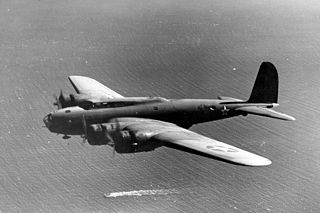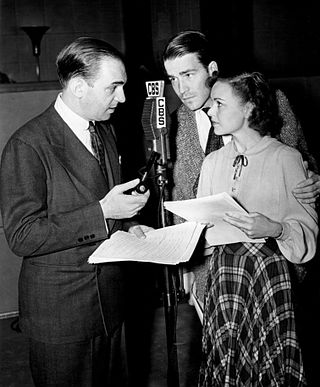
Counterspy was an espionage drama radio series that aired on the NBC Blue Network and Mutual from May 18, 1942, to November 29, 1957.
The year 1938 saw a number of significant events in radio broadcasting.

Ceiling Unlimited (1942–1944) is a CBS radio series created by Orson Welles and sponsored by the Lockheed-Vega Corporation. The program was conceived to glorify the aviation industry and dramatize its role in World War II.

Gene Autry's Melody Ranch is a Western variety radio show in the United States. A 15-minute pilot show aired on December 31, 1939. The program ran from January 7, 1940 to August 1, 1943, and from September 23, 1945 to May 16, 1956. The show's entire run was broadcast over the CBS radio network, sponsored by Doublemint gum. The approximately two-year interruption resulted from Autry's enlistment in the United States Army to serve in World War II. Initially titled Doublemint's Melody Ranch, the show's name was changed to Gene Autry's Melody Ranch in early 1941. Episodes were 30 minutes long except for a 15-minute version that ran from September 23, 1945 to June 16, 1946. The theme song was "Back in the Saddle Again".

The Adventures of Ellery Queen is a radio detective program in the United States. Several iterations of the program appeared on different networks, with the first one broadcast on CBS June 18, 1939, and the last on ABC May 27, 1948.

For the television series of the same name, see The Silver Theatre.
Valiant Lady is an American radio soap opera that was broadcast on ABC, CBS, and NBC at various times from March 7, 1938, through August 23, 1946, and later between October 8, 1951, and February 19, 1952.

Barbara Weeks was an American actress and voice talent in the Golden Age of Radio. She was best known for her work in soap operas.

Alice Frost was an American actress. An inaugural member of Orson Welles's Mercury Theatre on radio and the stage, she later performed the role of Pamela North on the radio series Mr. and Mrs. North for nearly 10 years.
Calling All Cars is an old-time radio police drama in the United States. It was broadcast on the CBS West Coast network and on the Mutual-Don Lee Network November 29, 1933 - September 8, 1939 and carried by transcription on stations in other areas. The program was notable for being one of the first police dramas on radio.

Chick Carter, Boy Detective is a 15-minute American old-time radio juvenile crime drama. It was carried on the Mutual Broadcasting System weekday afternoons from July 5, 1943 to July 6, 1945.
Claudia and David is an American old-time radio drama. One version was broadcast on CBS July 4, 1941 - September 26, 1941 and another was syndicated in 1947.
Don Winslow of the Navy was an American old-time radio juvenile adventure serial. It was broadcast on the Blue Network from October 19, 1937, until May 26, 1939, and was revived for a second run from October 5, 1942, until January 1, 1943.
Good News of 1938 is an American old-time radio program. It was broadcast on NBC from November 4, 1937, until July 25, 1940. As the years changed, so did the title, becoming Good News of 1939 and Good News of 1940. In its last few months on the air, it was known as Maxwell House Coffee Time. Some sources also refer to the program as Hollywood Good News. The program was notable for marking "the first time that a national network joined hands with a major film studio to create a show for sale to a commercial sponsor."
Hallmark Playhouse is an American old-time radio dramatic anthology series. It was broadcast on CBS from June 10, 1948 until February 1, 1953, and was described by one author as "a program that consistently produced the highest levels of production quality and value." Beginning on February 8, 1953, the program underwent changes of title, host, and format. It was broadcast as The Hallmark Hall of Fame until March 27, 1955, still on CBS.
Hop Harrigan is an American old-time radio juvenile adventure program. It was broadcast on ABC from August 31, 1942, until August 2, 1946, and on Mutual from October 2, 1946, until February 6, 1948. General Foods began sponsoring the program on October 2, 1944; it had previously been unsponsored.

I Deal in Crime was an American old-time radio detective drama. It was broadcast on ABC from January 21, 1946, until October 18, 1947, and on Mutual from October 25, 1947 until September 4, 1948. In 1947, the title was changed to Ross Dolan, Detective.
Island Venture is an American old-time radio adventure drama. It was broadcast on CBS from November 8, 1945, until June 20, 1946

The Jack Carson Show is an American old-time radio comedy-variety program. It was broadcast on different seasons on CBS and NBC, beginning on June 2, 1943, and ending on December 20, 1956. The program was also known as The Sealtest Village Store, and the New Jack Carson Show. It was carried on the CBC Dominion network in Canada, as well. Additionally, The Jack Carson Show is the title of a television program that was broadcast on NBC from October 22, 1954, until March 11, 1955.
Kate Hopkins, Angel of Mercy is an American old-time radio soap opera. After beginning as a transcribed program on seven stations on October 23, 1939, it was broadcast weekday afternoons on CBS from October 7, 1940, until April 3, 1942 and sponsored by Maxwell House coffee.










